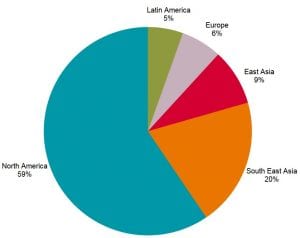Spotlight on student mobility at UCL
By ucypsga, on 23 July 2018
With Brexit negotiations ongoing, the future of Erasmus, the European Union’s student exchange programme, remains unclear in the UK – making the future of student mobility uncertain.
But as London’s Global University, UCL is committed to providing its students with a truly global experience. And while studying in the heart of London goes some way to providing this, every UCL undergraduate has the opportunity to gain international study experience, regardless of their degree programme.
UCL’s dedicated Study Abroad team exists to support and promote these opportunities for UCL students. Thanks to its work, today UCL has exchange agreements with over 250 institutions in 40 countries across five continents, including 48 of the world’s top 100 universities. But how many students travel abroad each year, and where are they heading?
Increase in outward mobility in 2017/18
Data shows that over the past year, UCL has significantly increased the number of international exchange opportunities it offers to students. In fact, the number of outwardly mobile undergraduates has increased by an estimated 35% since 2015/16.
In 2016/17, 1,164 undergraduate students (around 26% of the graduating cohort) experienced one week or more abroad, while 23.8% experienced four or more. As of July 2018, at least 1,292 students will take part in such programmes during 2017/18, with this figure expected to rise.
Taking a closer look at the data shows that the majority of UCL students are travelling to North America for exchange placements – 59% of the total, as demonstrated by the pie chart below.
Top destinations for these students are the University of California, the University of Toronto (U of T) and the University of British Colombia.
At 20% of the total, the second most popular region for UCL students taking up placements abroad is South East Asia and Australasia. Top choice institutions in this region are the University of Melbourne, followed by the National University of Singapore (NUS) and the University of Western Australia.
The next most popular regions for UCL students are East Asia, followed by Europe and Latin America. As the graph below demonstrates, these placements are at institutions in cities from Moscow to Hong Kong.
Short-term opportunities
For students who wish to study abroad but don’t have the opportunity to take part in an exchange programme as part of their course, there are also a number of short-term opportunities coordinated by UCL Study Abroad.
This August, for example, 46 UCL students are set to travel to Shanghai and Hangzhou as part of the Study China programme.
Inbound students
It’s also worth noting that each year, UCL in turn welcomes students for exchange placements from all over the world.
Echoing the pattern of UCL students travelling for placements abroad, the highest number of students coming to study at UCL in turn are from North America (59% of the total). These students hail from institutions including the University of California, U of T, the University of Pennsylvania and the University of Washington.
Beyond North America, UCL’s next biggest intake of students is from the National University of Singapore. Also in the top ten are the University of Hong Kong, the University of Melbourne and McGill University in Montreal.
Life-changing opportunities
Owain Evans is UCL’s Short Mobilities Co-ordinator. He said: “It is important for students to enhance their future employability in the ever-changing and increasingly competitive post-graduation environment. Research shows that students with international experiences achieve better degrees and secure better jobs, so we encourage as many students as possible to seek out these opportunities while studying at UCL.
“In addition to the positive effect on employability, there are a range of benefits available to students who spend time abroad, from improvements in language, communication, cultural awareness to the opportunity to build international networks. Put simply, international opportunities have the ability to change the lives of students who undertake them.
“The UCL Study Abroad team aims to inspire and support students who undertake international opportunities, and the increasing number of options we offer reflects the diversity and range of interests among the UCL student cohort.”
 Close
Close



